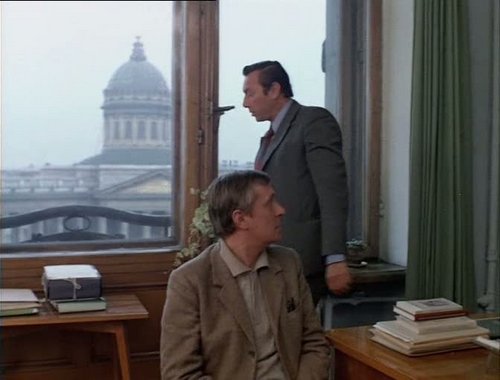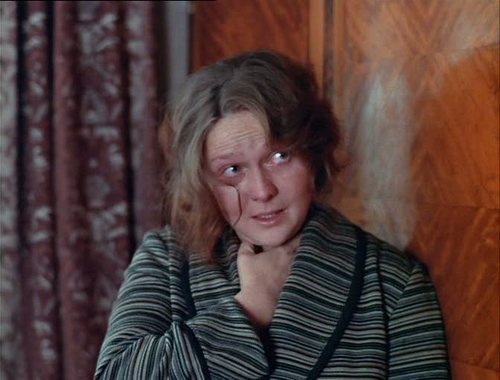This scene from Osenniy Marafon has stayed with me ever since I first saw it a few years ago, and has led to some of my recent reading. Oleg Basilashvili’s character (seated) has been informed that his just completed work of translation will not be published. The publisher explains: “…Simon just published an article with racist overtones. The progressives are putting up a hell of stink about it. It’s hardly the moment to puff him up by printing his work.”
It struck me as a plausible sort of scene, if repeated many times over and in many different variations, that could have constituted the state of affairs that provoked Alexander Solzhenitsyn to write his famous letter to the Fourth National Congress of Soviet Writers in May, 1967, twelve years before this film came out. Among many other things Solzhenitsyn had to say in that letter was the following description of how his own work was handled:
For three years now an irresponsible campaign of slander is being conducted against me, who fought all through the war as a battery commander and received military decorations. It is being said that I served time as a criminal, or surrendered to the enemy (I was never a prisoner of war), that I “betrayed” my country, “served the Germans.” That is the interpretation now being put on the 11 years I spent in camps and exile for having criticized Stalin. This slander is being spread in secret instructions and meetings by people holding official positions. I vainly tried to stop the slander by appealing to the board of the Writers Union of the R.S.F.R. [Russian Republic] and to the press. The board did not even retract, and not a single paper printed my reply to the slanderers. On the contrary, slander against me from rostrums has intensified and become more vicious within the last year, making use of distorted material from my confiscated files, and I have no way of replying.
My interest in this state of censorship is heightened by the increasing centralization of funding and control over research and publication in our own country, and the increasingly loud and high-placed calls for even greater central control. We haven’t yet progressed nearly to the state of affairs described by Solzhenitsyn, but just the same I thought there might be some practical utility in understanding the social relationships that constitute this type of system. It’s more insidious than the way Anna Politkovskaya was handled, and possibly has a more corrupting effect on the participants.
I presume Georgi Daneliya was very intentional in putting this kind of scene in the film. It’s a great fit with the whole theme of the film — of a person caught up in a system of deceit that he will not be able to resist.
With all this in mind, I found and read the book Nomenklatura (1984) by Michael Voslensky. That was a fascinating read, but one thing I learned from it is that contrary to what I had imagined, the movie scene is not showing the direct workings of the nomenklatura. The nomenklatura were a different stratum of society, I guess. Voslensky knew about the nomenklatura, having been part of it himself, but he did not have anything to say about careerism and social relations in, say, literary fields like the one portrayed in the film.
Now, if only I could think of a movie that would give me an excuse to talk about what I learned from Volensky’s book. Gray Wolves, maybe?
Back to Osenniy Marafon. I can now affirm that it stands up very well to repeated watching. I’ve put it on my Droid X after having learned that my AVS software has a built-in profile for converting to the .mp4 format that’s needed.
All the actors in the film did excellent work — including all three of the women who are complicating Andrei Pavlovich’s life. But the more I watch Natalya Gundareva (the wife) the more impressed I am with what she did. I don’t think I’ve ever seen anyone play the wronged wife the way she played it — but it’s a very believable, nuanced character. It would be interesting to read an analysis of her work, but I haven’t found much information about her in English other than a comment saying she played a wide variety of roles. She would be my age if she was still alive, but she died five years ago. I guess I’ll have to watch some of her other films and try to learn more for myself.

